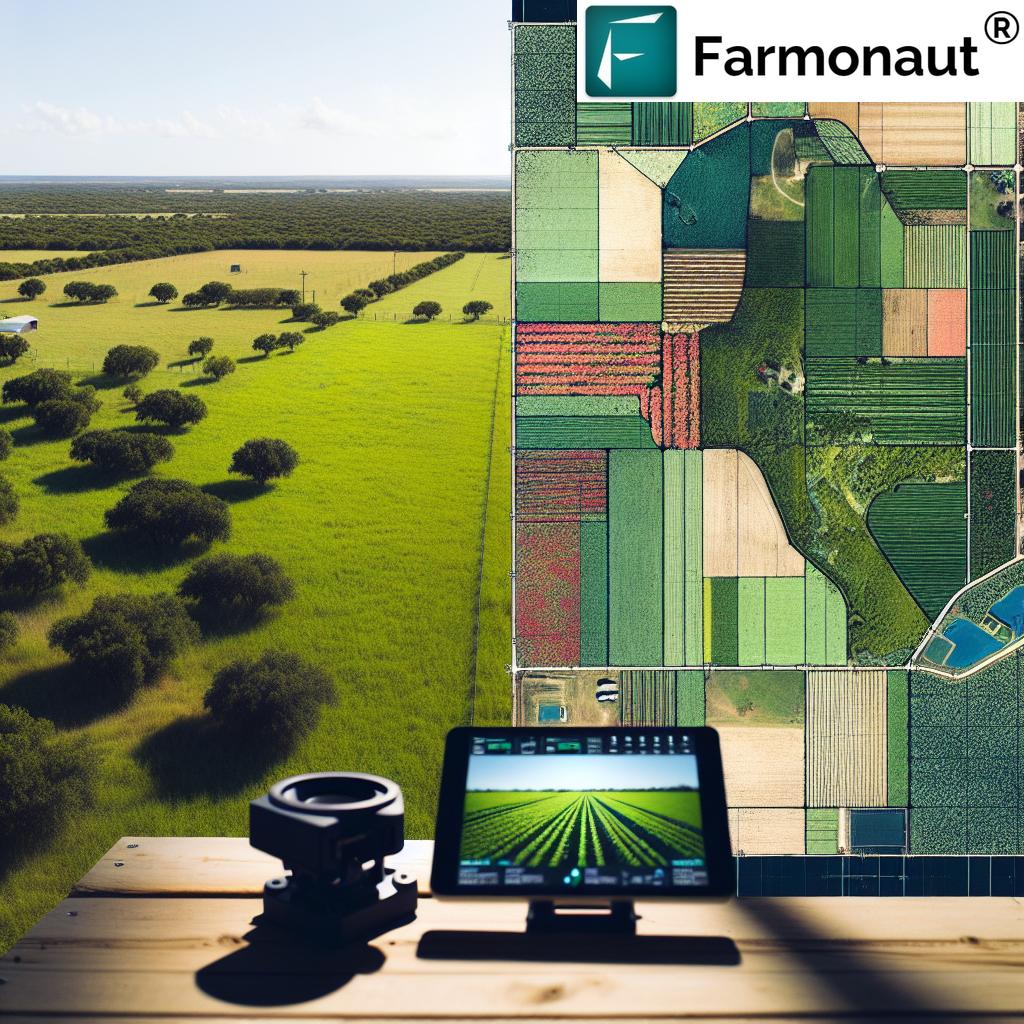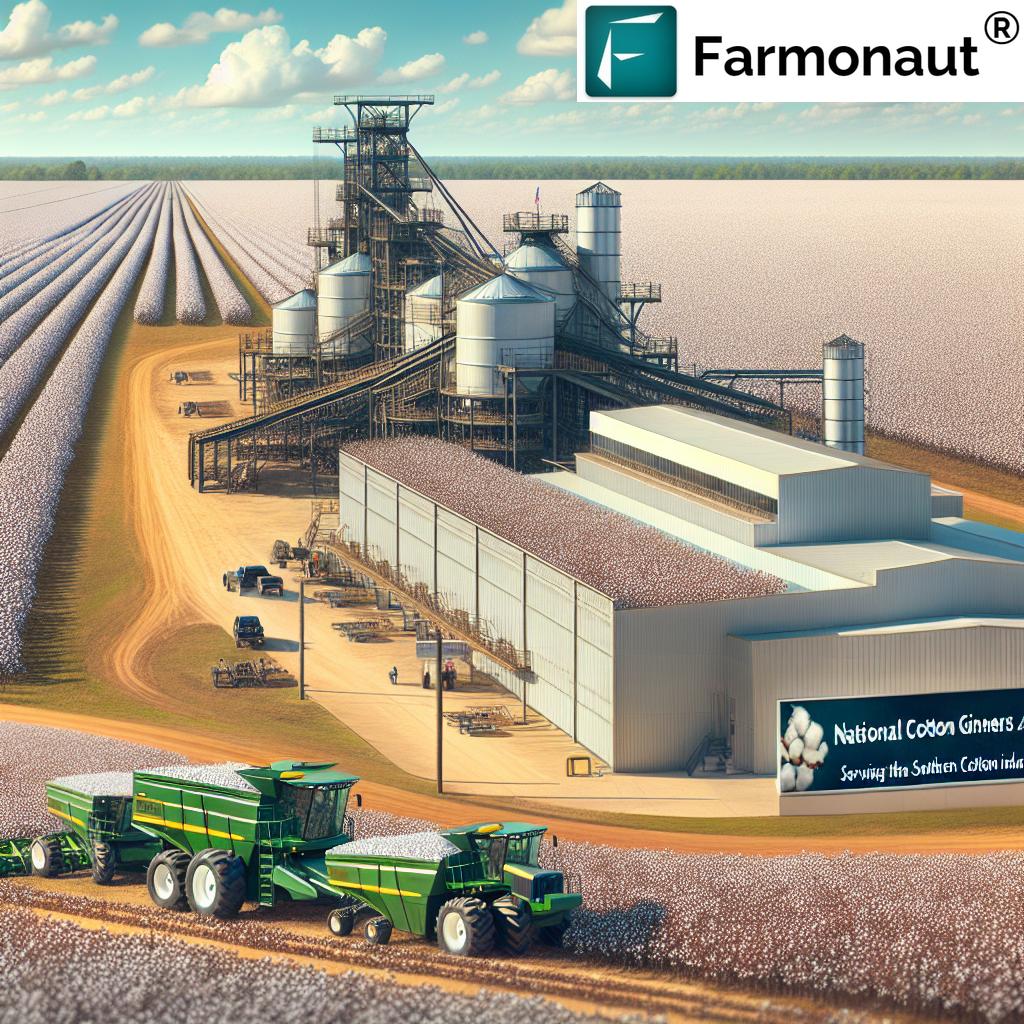Soil Testing Houston: 7 Steps for Better Yields
“Soil testing in Houston can increase crop yields by up to 30% through precise nutrient management.”
Introduction
In the heart of Texas, the thriving agricultural sector of Houston is propelled by innovation, environmental stewardship, and efficient land management. A key driver for modern farming and forestry in the region is soil testing Houston, which has become indispensable in optimizing crop yields and maintaining the health of our soils. As climate pressures and sustainability demands intensify, soil health analysis emerges as the foundation for productive, eco-friendly, and cost-effective agriculture.
This comprehensive guide explores the significance of soil testing Houston, details a step-by-step approach to efficient soil sampling, and demonstrates how nutrient management practices, advanced analysis techniques, and modern technology (such as that offered by Farmonaut) combine to create robust, sustainable land management Texas strategies.
Whether you are a farmer, forester, or agricultural stakeholder in Houston, this guide will provide essential insights into how soil fertility testing can be tailored to your unique conditions and goals—delivering both productivity and stewardship.
“Over 60% of Texas farmers use soil health analysis for sustainable land management and reduced environmental impact.”
Understanding Soil Testing: The Foundation of Houston’s Agricultural Success
Soil testing is the scientific analysis of soil samples to determine their chemical, physical, and biological properties. A comprehensive soil test assesses nutrient levels, pH balance, organic matter content, and myriad factors that influence plant growth and soil fertility.
Why is this so essential? Because, unlike a “one-size-fits-all” approach to fertilization or irrigation, soil analysis provides customized data on the actual needs of your land. For farmers and foresters in Houston, this means informed decisions that precisely address local soil challenges—such as nutrient leaching and water drainage problems common to Houston’s soils.
- Soil sample laboratory analysis offers direct information for precise resource usage.
- Soil health analysis establishes a foundation for long-term productivity—tracking changes over time and across management cycles.
- Using the results, you can actively optimize crop yield and reduce costs by avoiding unnecessary applications of fertilizer or irrigation water.
The Importance of Soil Testing Houston: Local Challenges, Local Solutions
Houston, positioned within the humid, hot southeast Texas region, possesses unique soil conditions. Its clay-rich soils, variable pH ranges, and frequent heavy rains pose both opportunities and challenges for agriculture and forestry.
Key Houston-specific soil concerns include:
- Nutrient leaching: Heavy rainfall can wash vital nutrients away, leading to deficiencies even if fertilizers were recently applied.
- Poor drainage: Clay soils tend toward waterlogging, restricting root development and plant growth.
- pH imbalances: Houston soils can be too acidic or alkaline, impacting the availability of certain nutrients for crops.
- Organic matter depletion: Over-intensive farming practices can erode organic matter content, undermining long-term soil fertility and overall health.
Regular soil testing Houston enables agricultural professionals to identify these issues early and adjust management practices accordingly. Consistent, localized testing means better yield optimization, smoother adoption of eco-friendly nutrient management approaches, and a more resilient farming future.
7 Essential Steps: Soil Testing Houston for Better Yields
In order to maximize the benefits of soil testing in Houston, it is crucial to follow a stepwise, regionally-adapted process—one that provides accurate, actionable data for sustainable nutrient management practices and crop yield optimization.
1. Define Your Objectives for Soil Testing
- Are you optimizing fertilizer application for row crops?
- Are you establishing a pasture, reforestation area, or specialty crops (fruits, nuts, vegetables)?
- Do you suspect a nutrient deficiency, pH problem, or drainage issue?
Stating clear goals allows you to select appropriate tests and ensures relevant interpretation of results.
2. Select Representative Sampling Locations
- Divide fields into distinct management zones based on cropping history, visible crop health differences, or topography.
- In Houston, account for local soil variation by sampling in both upland and low-lying areas, and in known problem spots (waterlogged, poor growth, etc.).
3. Soil Sample Collection Techniques
- Use a clean soil probe or auger to extract samples from the desired root zone depth (usually 0-6 inches for most crops).
- Collect at least 15–20 samples per management zone, mix them thoroughly in a clean bucket to form a composite sample.
- Avoid sampling immediately after fertilization, heavy rainfall, or while soil is saturated/clumpy.
Refer to guides from agricultural extension offices for specific Houston instructions.
4. Proper Soil Sample Handling & Submission
- Air-dry samples promptly after collection if not sending immediately.
- Label each sample accurately with field/zone details and sampling date.
- Deliver to a certified soil testing laboratory in Houston or statewide.
5. Soil Laboratory Analysis: What to Test For
- pH (acidity/alkalinity)
- Macronutrients: Nitrogen (N), Phosphorus (P), Potassium (K)
- Organic matter content
- Micronutrients (Zinc, Iron, Boron, etc.), especially important for horticulture and specialty crops
- Physical properties: Soil texture, structure, and moisture retention can be analyzed as needed.
6. Interpretation of Test Results and Expert Recommendations
- Request actionable recommendations from your lab or agricultural extension office.
- Apply results to develop targeted fertilizer plans, liming schedules, or organic amendments for improved soil health and crop yield.
- If results are complex, consult local agronomy experts or utilize digital advisory platforms such as those provided by Farmonaut.
7. Implement, Monitor, and Adjust Management Practices
- Log changes in crop health, productivity, and visible soil improvement following amendment applications or new management strategies.
- Conduct repeat soil health analysis every 2–3 years (or more frequently if making major changes).
- Leverage digital tools and remote sensing (such as Farmonaut’s real-time crop health monitoring) for continuous monitoring and adaptive management.
Interpreting Soil Test Results & Sustainable Action Table
After completing your soil sample laboratory analysis, the results must be effectively interpreted for practical, sustainable action. Below is a table tailored specifically for Houston and Texas crops—offering optimal nutrient ranges, likely local test findings, estimated yield impacts, and eco-friendly management recommendations:
| Soil Parameter | Estimated Optimal Range (TX Crops) |
Common Test Results in Houston |
Yield Impact (Estimated %) |
Sustainable Management Recommendation |
|---|---|---|---|---|
| Soil pH | 6.0–7.0 (row crops) 5.5–6.5 (fruits/vegetables) |
5.2–7.5: Acidic patches in lowlands |
Deficiency/Excess can reduce yields by 25–40% | Apply lime to raise pH or sulfur to lower; rotate acid-tolerant cover crops; monitor annually |
| Nitrogen (N) | 40–120 lbs/acre (season) | Often deficient, especially after heavy rains | Deficiency may cut yield by 15–25% | Adopt split fertilizer applications, plant legumes, add compost or manure |
| Phosphorus (P) | 35–50 ppm | Variable; sometimes low in sandier areas | Deficiency can lower yield by 10–18% | Use phosphorus-efficient varieties; apply rock phosphate or recycled organics; avoid over-supplying |
| Potassium (K) | 100–250 ppm | Moderate to low in intensively cropped fields | Up to 15% potential loss if not managed | Incorporate wood ash; select potassium-efficient crop rotations |
| Organic Matter (%) | 3–6% | Often 1.5–3% (depleted in Houston) | Low OM reduces moisture retention, yields drop up to 20% | Plant cover crops/green manures; add compost mulches; reduce tillage |
Tip: Each parameter interrelates—soil health analysis is holistic. By monitoring and correcting each metric, Houston farmers can achieve both short-term boosts and ongoing soil resilience.
Soil Health Analysis and Best Management Practices for Houston
Comprehensive soil health analysis extends beyond basic nutrient testing. Let’s explore the key elements and modern strategies to keep your land sustainable, productive, and environmentally responsible in Texas:
Regular Monitoring & Adaptive Management
- Track soil test results over time to spot trends and adapt management strategies proactively.
- Monitor the effectiveness of nutrient management practices and organic amendments using record-keeping apps or spreadsheets.
- Supplement visual soil observations (color, texture, structure) with quantitative analysis for reliable insights.
Integrating Digital and Satellite Solutions
- Use farm management platforms (like Farmonaut’s Agro Admin App) to sync soil data with crop growth monitoring and irrigation scheduling.
- Leverage real-time satellite imagery to visualize crop health, detect emerging stress zones, and plan variable-rate interventions.
- Tap into digital advisory tools for expert guidance on interpreting lab reports and seasonal adjustment suggestions.
Eco-friendly & Sustainable Land Management Practices
- Minimize **runoff** and **leaching** by applying fertilizers in sync with crop growth (split application).
- Enhance soil structure and water holding capacity by boosting organic matter content (compost, green manures).
- Rotate crops, especially with legumes and deep-rooted species, to diversify nutrient cycling.
- Utilize conservation tillage and cover crops to reduce erosion and build resilience.
- Incorporate digital tools for **carbon footprinting**—Farmonaut’s Carbon Footprinting Module helps track, analyze, and reduce your farm’s emissions.
The Benefits of Soil Testing for Sustainable Land Management Texas
- Optimized Fertilizer Application: Targeted fertilization based on soil test results reduces costs and increases efficiency, preventing unnecessary applications and minimizing environmental risks.
- Improved Crop Yield Optimization: By understanding the limiting soil factors—nutrient deficiencies, toxicities, and pH imbalances—farmers in Houston achieve more robust, healthy crops and increased productivity.
- Environmental Conservation Farming: Well-managed nutrient management practices lead to reduced runoff into Texas waterways, supporting sustainable land management and stewardship.
- Cost Savings: Soil analysis identifies resource surpluses or shortfalls, helping farmers avoid over-purchasing fertilizers, amendments, and water.
- Long-Term Soil Health Monitoring: Continuous soil health analysis ensures that the land stays productive across generations, preventing degradation and supporting resilience to climate shocks.
- Precision Decision-Making: With agricultural soil testing services, farmers make informed, data-driven decisions for every field and every season.
- Compliance & Market Access: Eco-conscious consumers and supply chains increasingly demand proof of sustainable production. Testing results—combined with digital traceability solutions—build transparency and trust.
- Insurance and Financing Benefits: Accurate records of soil analysis, crop health, and land improvements can be used for loan, insurance, and grant applications—especially when verified digitally via platforms (Farmonaut Crop Loan & Insurance).
Advanced Tools: Farmonaut for Soil, Crop & Resource Optimization
Modern soil testing Houston is exponentially more powerful when paired with digital dashboards, remote sensing, and AI-driven analysis. Farmonaut stands at the nexus of this revolution, providing tools that help manage soils, monitor crop health, and optimize inputs for sustainable land management Texas.
- Satellite-Based Crop Health Monitoring: We utilize NDVI (Normalized Difference Vegetation Index) via satellite to assess the real-time growth and vigor of crops, alongside moisture levels and stress zones—a game-changer for adaptive soil and crop management.
- AI-Powered Farm Advisory: Our Jeevn AI Advisory provides Houston farmers with actionable advice informed by the most current satellite data, local weather trends, and expert agronomic knowledge.
- Resource Management & Fleet Tracking: With Farmonaut’s platform, agribusinesses can efficiently allocate vehicles and resources, further reducing input waste and supporting sustainable farming.
- Carbon Footprint Tracking: Our system enables farmers to measure, report, and improve on their carbon footprint—responding to evolving sustainability standards and market expectations. Try it here: Farmonaut Carbon Footprinting.
- Blockchain-Backed Product Traceability: Farmonaut’s traceability feature bolsters consumer trust in Texas-grown crops by making every transaction transparent and tamper-proof: Product Traceability.
- APIs and Integrations: Growers and businesses can connect to our rich data stream for automation and custom analysis: Farmonaut API | API Developer Docs.
Our platform is accessible through Android, iOS, and Web Applications:
Any scale of operation—from smallholder plots to vast commercial estates—can benefit from Farmonaut’s scalable, data-driven ecosystem, making precision farming affordable, accessible, and effective for all.
Want to explore subscription plans for your operation?
FAQ: Soil Testing and Sustainable Agriculture in Houston
1. What is soil testing and why is it critical in Houston?
Soil testing is the process of analyzing soil samples for key nutrient levels, pH, and organic matter content. It’s crucial in Houston due to highly variable soils, frequent leaching from heavy rainfall, and the risk of both acidification and nutrient depletion. Regular testing helps target management practices for successful, sustainable yields.
2. How often should I test my soil in Houston?
For most Houston farmers and foresters, conducting comprehensive soil tests every 2–3 years is optimal, with more frequent spot tests if growing high-value, specialty, or fast-turnover crops.
3. What is the best time of year to perform soil sampling?
The best window is in early spring or late fall, after harvest and before major field operations. Avoid periods of excessive soil moisture, drought, or immediately after fertilization.
4. Which parameters are most important for optimizing yields in Houston?
Focus on pH, Nitrogen, Phosphorus, Potassium, and organic matter. If needed, test for micronutrients, salinity, and unique physical properties relevant to your farm.
5. How can I use modern technology to boost my soil management?
Satellite-based platforms like Farmonaut let you overlay soil test results with live crop health data, receive AI-driven advice, and optimize resources for sustainable land management Texas goals. You can explore Farmonaut’s large-scale management solution for integrated guidance.
6. Does soil testing help with climate adaptation?
Absolutely. Soil tests enable farmers and land managers to adopt climate-smart strategies such as cover cropping, organic amendment, and carbon footprint tracking, all vital for resilience.
7. Where can I access soil testing services in Houston?
Licensed private labs, university extension offices, and some digital farm management platforms help with soil sample laboratory analysis. For integrated digital records and actionable advice, consider Farmonaut’s platform.
8. What’s an example of advanced sustainable land management in Texas?
Combining soil health analysis, organic amendment, diverse crop rotations, and digital monitoring (like Farmonaut’s satellite insights) creates a closed-loop, eco-friendly approach that maintains soils and maximizes yields for the long term.
Conclusion
Soil testing Houston is a cornerstone of modern, ethical agriculture—delivering the scientific analysis and actionable insight required for sustainable, high-yield management. By understanding and addressing the unique challenges of Houston’s soils, farmers and land managers ensure not only the fertility and productivity of their operations, but also the environmental stewardship that Texas agriculture demands.
When paired with AI-driven advisory, live satellite crop monitoring, and sustainable nutrient management practices, soil health analysis becomes a holistic tool for crop yield optimization and environmental conservation farming.
Explore Farmonaut’s affordable, scalable digital solutions for real-time soil, crop, and carbon data. Equip yourself for the future of responsible agriculture—right here in Houston, Texas. Get started today!


















